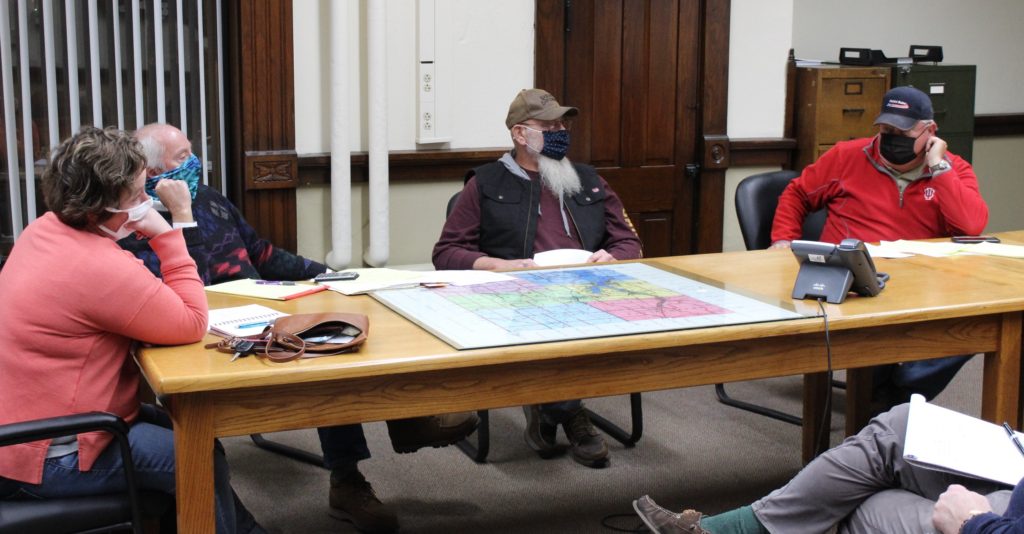
By John Estridge
How long the tax has been collected in Union County, how the money is to be spent and other factors were very much up for debate during the initial meeting of the Union County Innkeepers Board.
Thursday night, December 3, that meeting of the three-member Union County Innkeepers Board occurred in the Union County Commissioners room.
According to the Indiana Department of Revenue website, Union County has been collecting the 5 percent tax since January 1, 2018. (See related article concerning the specifics of the Innkeepers Tax law.)
The three members, Brynn Ramadanovic, Kent Reineking and Bob Matheny, make up the board.
During the more than one hour meeting, the board disbursed $40,000 of its $112,000 holdings, giving $30,000 to the Union County Bicentennial Committee and $10,000 to the Union County Development Corporation.
First action was to elect officers. Matheny was elected the president, Reineking the vice president and Ramadanovic the secretary. Union County Commissioner Howard Curry kept notes during the first meeting while Melissa Browning, UCDC director, offered advice such as handing out copies of Roberts Rules of Order to the participants.
While the three members doled out the money, it was far from a knee-jerk reaction. They intensely discussed their individual visions for the county and how they would like to see the money spent. However, there are severe limitations on what the money can be spent on due to the wording of the Indiana Code associated with the Innkeepers Tax. (See related article.)
Reineking said he really enjoys the mural on the west side of Bertch’s Hardware and the saying: “Plant your roots in Union County.” He said that should become a branding or the tag line for the county as it tries to grow.
Ramadanovic said she thought the Innkeepers Board might want to do more with the money than fund festivals. She said she enjoys festivals and works at them in the community, but said maybe the board members should save the money and try to do more that is bigger. She said people always say there is nothing to do in Union County.
“I’m not going anywhere,” Ramadanovic said. “This is my home. But when I think about that money, I have no problem saying ‘sure, we’re having this celebration,’ because I love our community coming together, too. I like having new people come in, and we have to grow the community. But, what makes people stay here, besides it just being a small town?”
Curry said people in Union County are faced with the chicken and egg scenario when it deals with growth.
“We’ve thought long and hard about it,” Curry said. “I spent years with the development corporation … I still say it’s like the chicken and the egg: You can’t get an investor to come out here and build a theme park with a small population. You can’t go to the bank and say ‘I want to build a store here that requires $15,000 a day income’ without the people. The people have to be first. And how do you get those bodies?”
Browning said it needs an attraction to bring in the people, but Curry said again, to be able to invest in an attraction, one needs the bodies.
And he said one of the things that makes Union County attractive to some people is the fact there are no (huge) attractions. It is a small, safe community. He said property taxes are relatively inexpensive. The cost of living is inexpensive. And the people in the community are friendly.
Another problem in the area is affordable housing, Curry said.
“In my time in public here in town, everything boils back — whenever you get back to the nuts and bolts of our tax (revenue) problem — it goes back to (lack of) housing,” Curry said. “There are things happening now to improve our housing, the potential to grow. I think, in five years, we’re going to see numerous $150 to $200,000 homes being built.”
When asked what those things are that are in motion, that are happening, Browning said she was not at liberty to say. But she did say her office was contacted about a company interested in building new homes in the county. She gave them several sites, and the company has chosen on one of the places.
She said part of the reason for the renewed interest in places like Union County is the pandemic has shown major companies they no longer have to build large office buildings in a central location, but their employees can live in various areas and still be able to be as productive.
Browning also said a Purdue study shows there is a need for available homes in the price range Curry mentioned earlier, that of $150,000 to $200,000.
Curry said it is again the attractions of the low cost of living, the friendliness and the safety the community provides.
“Why not live in Union County where the cost of living is half of what it is in Oxford?” Curry said.
Reineking discussed the building of a bike trail to connect the park with the town. However, he does not want it to be along Indiana 101, which has been floated in the past by some state officials. Instead, he said along Snake Hill Road west of Liberty and then into the park the back way would be a good place for the path.
He said the Innkeepers Board could help fund the building and maintenance of the path. Browning said she and Reineking could go out to the state park and talk with park officials about getting the state to help out in a venture of that type.
They also discussed advertising for the county. Reineking was in favor of online advertising while Curry favored billboards along major thoroughfares such as the area interstates.
Near the end of the meeting, the board members discussed the requests in front of them and voted unanimously to approve both of the requests.
According to Curry, the Bicentennial Committee needs the money to secure entertainment for the Bicentennial. He said it is his understanding some of the biggest names in Bluegrass are supposed to appear and perform during events at the Bicentennial celebration.
Browning said the money she requested will go toward a Union County Guide. And part of the money will go for advertising different annual festivals within the county such as the Liberty Festival and Christmas in Our Hometown celebration.
Since the UCDC is a registered not-for-profit organization, it will be a conduit for the Bicentennial Committee money and hold the money until it is needed by the Bicentennial Committee, Curry and Browning said.
Curry said the board will meet at least quarterly, but can be called into a meeting earlier than that if there is a need.
